Fleurs du Mal Magazine


Or see the index
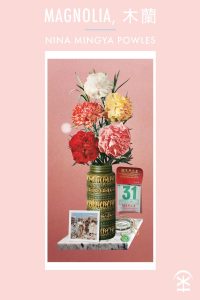 Women Poet’s Prize and Nan Shepherd Prize winner: Nina Mingya Powles publishes a much-anticipated second collection in July 2025
Women Poet’s Prize and Nan Shepherd Prize winner: Nina Mingya Powles publishes a much-anticipated second collection in July 2025
– In the Hollow of the Wave examines Orientalism, art and artmaking in a time of ecological crisis in distinctive poems that are elemental and tactile, shaped by memory and landscapes of the body.
Powles’ debut poetry collection, Magnolia, was shortlisted for the Forward Prize for Best First Collection and the Ondaatje Prize.
 Nina Mingya Powles (born 1993) is a New Zealand poet and essayist. Born in Wellington, Powles has spent time living in Shanghai and London.
Nina Mingya Powles (born 1993) is a New Zealand poet and essayist. Born in Wellington, Powles has spent time living in Shanghai and London.
Her poetry and essay collections are inspired by nature and her Chinese – Malaysian heritage, and she has received a number of notable awards including the inaugural Women Poets’ Prize in 2018.
In the Hollow of the Wave (Poems)
by Nina Mingya Powles
Nine Arches Press
ISBN: 9781916760226
Publication date: 24th July 2025
Format: Paperback
72 pp
ISBN: 9781916760226
Price: £11.99
•fleursdumal.nl magazine
More in: #Editors Choice Archiv, - Book News, - Bookstores, Archive O-P, Archive O-P, Grimm, Andersen e.o.: Fables, Fairy Tales & Stories
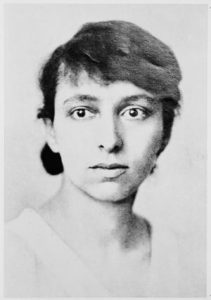
Märchen
Ich hab vor deinem Hause still gestanden
In einer Nacht.
Und hatte ganz dich lieb und ohne Maßen;
Ich wies zu dir den Sternen goldne Straßen
Und habe selig stumm gelacht.
Ob meinem losen Haar hob ich die Arme
Wie Zweige, schlank und rund.
Da stürzte Regen in das Mainachtschweigen
Und rief sich zage Blüten aus den Zweigen,
Und jede war ein blasser Mund.
Du aber kamst nicht.
So streute ich mit lächelndem Verschwenden
Dem Mond die Blumen her.
Und spürte Treiben herber, dunkler Kräfte,
Mir ward die Frucht voll süßer, süßer Säfte;
Schon fiel sie, duftend, weich und schwer.
Du aber kamst nicht.
Eishagel tanzte höhnend auf den Steinen.
Da klaffte schwarz ein Schacht.
Drein ließ ich die zerbrochnen Arme hangen. –
Geblüht und Frucht getragen – und vergangen
In einer Nacht.
Gertrud Kolmar
(1894 – 1943)
Märchen
• fleursdumal.nl magazine
More in: #Editors Choice Archiv, Archive K-L, Archive K-L, Grimm, Andersen e.o.: Fables, Fairy Tales & Stories, Holocaust, Kolmar, Gertrud
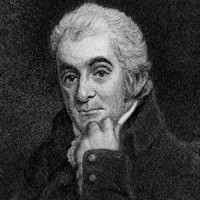
The Sleeping Beauty
Sleep on, and dream of Heaven awhile—
Though shut so close thy laughing eyes,
Thy rosy lips still wear a smile
And move, and breathe delicious sighs!
Ah, now soft blushes tinge her cheeks
And mantle o’er her neck of snow:
Ah, now she murmurs, now she speaks
What most I wish—and fear to know!
She starts, she trembles, and she weeps!
Her fair hands folded on her breast:
—And now, how like a saint she sleeps!
A seraph in the realms of rest!
Sleep on secure! Above control
Thy thoughts belong to Heaven and thee:
And may the secret of thy soul
Remain within its sanctuary!
Samuel Rogers
(1763 – 1855)
The Sleeping Beauty
• fleursdumal.nl magazine
More in: # Classic Poetry Archive, Archive Q-R, Archive Q-R, Grimm, Andersen e.o.: Fables, Fairy Tales & Stories
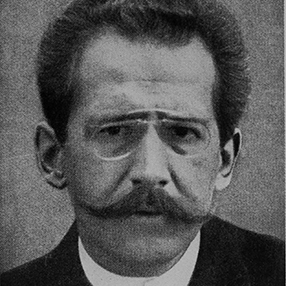
Auf einem Berg aus Zuckerkant
Auf einem Berg aus Zuckerkant,
unter einem blühenden Machandelbaum,
blinkt mein Pfefferkuchenhäuschen.
Seine Fensterchen sind aus Goldpapier,
aus seinem Schornstein raucht Watte.
Im grünen Himmel, über mir,
rauscht die Weihnachtstanne.
In meinem See aus Staniol
spiegeln sich alle ihre Engel, alle ihre Lichter!
Die kleinen Kinder stehn rum
und staunen mich an.
Ich bin der Zwerg Turlitipu.
Mein dicker Bauch ist aus Traganth,
meine Beinchen Streichhölzer,
meine listigen Äugelchen
Korinthen.
Arno Holz
(1863 – 1929)
Auf einem Berg aus Zuckerkant
(aus: “Phantasus”)
• fleursdumal.nl magazine
More in: #Experimental Poetry Archive, 4SEASONS#Winter, Archive G-H, Archive G-H, Expressionism, Grimm, Andersen e.o.: Fables, Fairy Tales & Stories
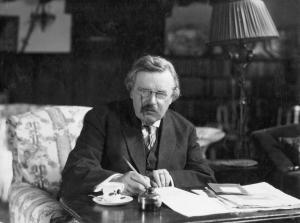
A Fairy Tale
All things grew upwards, foul and fair:
The great trees fought and beat the air
With monstrous wings that would have flown;
But the old earth clung to her own,
Holding them back from heavenly wars,
Though every flower sprang at the stars.
But he broke free: while all things ceased,
Some hour increasing, he increased.
The town beneath him seemed a map,
Above the church he cocked his cap,
Above the cross his feather flew
Above the birds and still he grew.
The trees turned grass; the clouds were riven;
His feet were mountains lost in heaven;
Through strange new skies he rose alone,
The earth fell from him like a stone,
And his own limbs beneath him far
Seemed tapering down to touch a star.
He reared his head, shaggy and grim,
Staring among the cherubim;
The seven celestial floors he rent,
One crystal dome still o’er him bent:
Above his head, more clear than hope,
All heaven was a microscope.
G. K. Chesterton
(1874-1936)
A Fairy Tale
• fleursdumal.nl magazine
More in: Archive C-D, Chesterton, Gilbert Keith, G.K. Chesterton, Grimm, Andersen e.o.: Fables, Fairy Tales & Stories
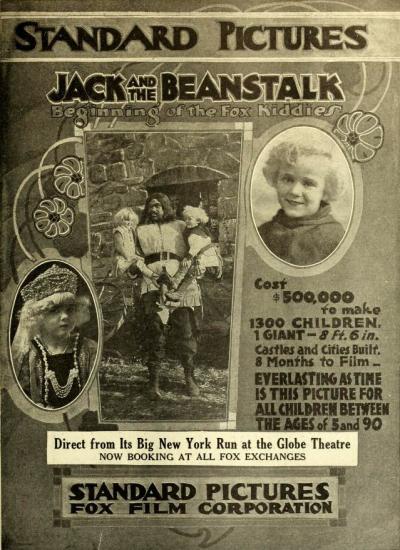
Jack And The Bean-Stalk
A lazy and careless boy was Jack,–
He would not work, and he would not play;
And so poor, that the jacket on his back
Hung in a ragged fringe alway;
But ’twas shilly-shally, dilly-dally,
From day to day.
At last his mother was almost wild,
And to get them food she knew not how;
And she told her good-for-nothing child
To drive to market the brindle cow.
So he strolled along, with whistle and song,
And drove the cow.
A man was under the wayside trees,
Who carried some beans in his hand–all white.
He said, “My boy, I’ll give you these
For the brindle cow.” Jack said, “All right.”
And, without any gold for the cow he had sold,
Went home at night.
Bitter tears did the mother weep;
Out of the window the beans were thrown,
And Jack went supperless to sleep;
But, when the morning sunlight shone,
High, and high, to the very sky,
The beans had grown.
They made a ladder all green and bright,
They twined and crossed and twisted so;
And Jack sprang up it with all his might,
And called to his mother down below:
“Hitchity-hatchet, my little red jacket,
And up I go!”
High as a tree, then high as a steeple,
Then high as a kite, and high as the moon,
Far out of sight of cities and people,
He toiled and tugged and climbed till noon;
And began to pant: “I guess I shan’t
Get down very soon!”
At last he came to a path that led
To a house he had never seen before;
And he begged of a woman there some bread;
But she heard her husband, the Giant, roar,
And she gave him a shove in the old brick oven,
And shut the door.
And the Giant sniffed, and beat his breast,
And grumbled low, “Fe, fi, fo, fum!”
His poor wife prayed he would sit and rest,–
“I smell fresh meat! I will have some!”
He cried the louder, “Fe, fi, fo, fum!
I will have some.”
He ate as much as would feed ten men,
And drank a barrel of beer to the dregs;
Then he called for his little favorite hen,
As under the table he stretched his legs,–
And he roared “Ho! ho!”–like a buffalo–
“Lay your gold eggs!”
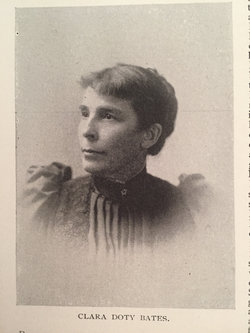
She laid a beautiful egg of gold;
And at last the Giant began to snore;
Jack waited a minute, then, growing bold,
He crept from the oven along the floor,
And caught the hen in his arms, and then
Fled through the door.
But the Giant heard him leave the house,
And followed him out, and bellowed “Oh-oh!”
But Jack was as nimble as a mouse,
And sang as he rapidly slipped below:
“Hitchity-hatchet, my little red jacket,
And down I go!”
And the Giant howled, and gnashed his teeth.
Jack got down first, and, in a flash,
Cut the ladder from underneath;
And Giant and Bean-stalk, in one dash,–
No shilly-shally, no dilly-dally,–
Fell with a crash.
This brought Jack fame, and riches, too;
For the little gold-egg hen would lay
An egg whenever he told her to,
If he asked one fifty times a day.
And he and his mother lived with each other
In peace alway.
Clara Doty Bates
(1838 – 1895)
Jack And The Bean-Stalk
Versified by Mrs. Clara Doty Bates
fleursdumal.nl magazine
More in: Archive A-B, Archive A-B, Bates, Clara Doty, Children's Poetry, Grimm, Andersen e.o.: Fables, Fairy Tales & Stories, Tales of Mystery & Imagination
Een vader is een man die kinderen verwekt,’ antwoordde je toen ik er eens naar vroeg.
‘Wie heeft mij dan verwekt?’ wilde ik weten. Je pakte me bij mijn kin en keek me indringend aan.
‘We zijn niet op zoek naar een vader,’ zei je. ‘We zijn op zoek naar een prins.’
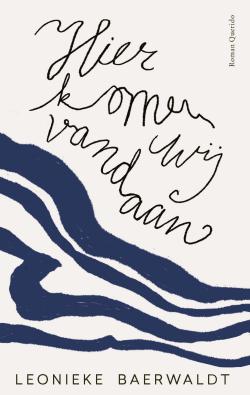
Hier komen wij vandaan –
Leonieke Baerwaldt
Een moeder en dochter leiden een zwervend bestaan, een fabrieksarbeider droomt erover een tropische-vissenwinkel te beginnen, twee geliefden besluiten samen een huis te bouwen en de kleine zeemeermin wordt geconfronteerd met de harde werkelijkheid.
In dit verhaal over diermensen en mensdieren vinden de sprookjes van Andersen en Grimm hun eigentijdse weerklank. Hier komen wij vandaan is een intens en bijzonder debuut van een verrassende nieuwe stem in de literatuur.
Auteur: Leonieke Baerwaldt
Titel: Hier komen wij vandaan
Vorm Paperback
Uitgever Querido
Druk 1e
Verschenen 24-08-2021
Taal Nederlands
Pagina’s 224 pp.
Genre Literaire fictie
NUR: 301
ISBN 9789021421278
Prijs: € 20,00
• fleursdumal.nl magazine
More in: - Book News, - Book Stories, Archive A-B, Grimm, Andersen e.o.: Fables, Fairy Tales & Stories, Tales of Mystery & Imagination

Little Red Riding-Hood
If you listen, children, I will tell
The story of little Red Riding-hood:
Such wonderful, wonderful things befell
Her and her grandmother, old and good
(So old she was never very well),
Who lived in a cottage in a wood.
Little Red Riding-hood, every day,
Whatever the weather, shine or storm,
To see her grandmother tripped away,
With a scarlet hood to keep her warm,
And a little mantle, soft and gay,
And a basket of goodies on her arm.
A pat of butter, and cakes of cheese,
Were stored in the napkin, nice and neat;
As she danced along beneath the trees,
As light as a shadow were her feet;
And she hummed such tunes as the bumble-bees
Hum when the clover-tops are sweet.
But an ugly wolf by chance espied
The child, and marked her for his prize.
“What are you carrying there?” he cried;
“Is it some fresh-baked cakes and pies?”
And he walked along close by her side,
And sniffed and rolled his hungry eyes.
“A basket of things for granny, it is,”
She answered brightly, without fear.
“Oh, I know her very well, sweet miss!
Two roads branch towards her cottage here;
You go that way, and I’ll go this.
See which will get there first, my dear!”
He fled to the cottage, swift and sly;
Rapped softly, with a dreadful grin.
“Who’s there?” asked granny. “Only I!”
Piping his voice up high and thin.
“Pull the string, and the latch will fly!”
Old granny said; and he went in.

He glared her over from foot to head;
In a second more the thing was done!
He gobbled her up, and merely said,
“She wasn’t a very tender one!”
And then he jumped into the bed,
And put her sack and night-cap on.
And he heard soft footsteps presently,
And then on the door a timid rap;
He knew Red Riding-hood was shy,
So he answered faintly to the tap:
“Pull the string and the latch will fly!”
She did: and granny, in her night-cap,
Lay covered almost up to her nose.
“Oh, granny dear!” she cried, “are you worse?”
“I’m all of a shiver, even to my toes!
Please won’t you be my little nurse,
And snug up tight here under the clothes?”
Red Riding-hood answered, “Yes,” of course.
Her innocent head on the pillow laid,
She spied great pricked-up, hairy ears,
And a fierce great mouth, wide open spread,
And green eyes, filled with wicked leers;
And all of a sudden she grew afraid;
Yet she softly asked, in spite of her fears:
“Oh, granny! what makes your ears so big?”
“To hear you with! to hear you with!”
“Oh, granny! what make your eyes so big?”
“To see you with! to see you with!”
“Oh, granny! what makes your teeth so big?”
“To eat you with! to eat you with!”
And he sprang to swallow her up alive;
But it chanced a woodman from the wood,
Hearing her shriek, rushed, with his knife,
And drenched the wolf in his own blood.
And in that way he saved the life
Of pretty little Red Riding-hood.
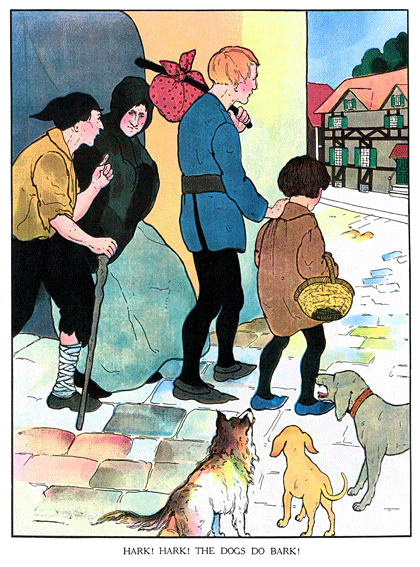
Hark, hark
The dogs do bark
Beggars are coming to town;
Some in jags,
Some in rags,
And some in velvet gowns.
Clara Doty Bates
(1838 – 1895)
Little Red Riding-Hood
Versified by Mrs. Clara Doty Bates
fleursdumal.nl magazine
More in: Archive A-B, Archive A-B, Bates, Clara Doty, Children's Poetry, Grimm, Andersen e.o.: Fables, Fairy Tales & Stories, Tales of Mystery & Imagination
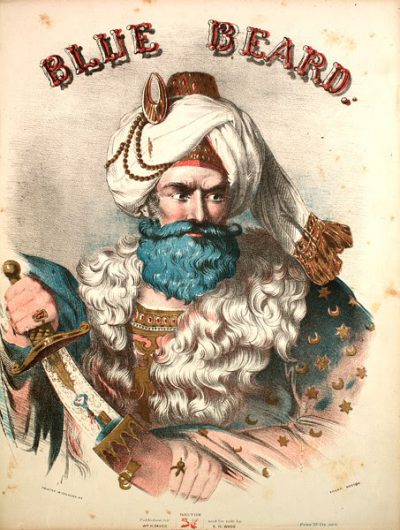
Blue Beard
Once on a time there was a man so hideous and ugly
That little children shrank and tried to hide when he appeared;
His eyes were fierce and prominent, his long hair stiff like bristles,
His stature was enormous, and he wore a long blue beard–
He took his name from that through all the country round about him,–
And whispered tales of dreadful deeds but helped to make him feared.
Yet he was rich, O! very rich; his home was in a castle,
Whose turrets darkened on the sky, so grand and black and bold
That like a thunder-cloud it looked upon the blue horizon.Blue Beard
He had fertile lands and parks and towns
and hunting-grounds and gold,
And tapestries a queen might covet, statues, pictures, jewels,
While his servants numbered hundreds,
and his wines were rare and old.
Now near to this old Blue-beard’s castle lived a lady neighbor,
Who had two daughters, beautiful as lilies on a stem;
And he asked that one of them be given him in marriage–
He did not care which one it was, but left the choice to them.
But, oh, the terror that they felt, their efforts to evade him,
With careless art, with coquetry, with wile and stratagem!
He saw their high young spirits scorned him, yet he meant to conquer.
He planned a visit for them,–or, ’twas rather one long fête;
And to charming guests and lovely feasts, to music and to dancing,
Swung wide upon its hinges grim the gloomy castle gate.
And, sure enough, before a week was ended, blinded, dazzled,
The youngest maiden whispered “yes,” and yielded to her fate.
And so she wedded Blue-beard–like a wise and wily spider
He had lured into his web the wished-for, silly little fly!
And, before the honeymoon was gone, one day he stood beside her,
And with oily words of sorrow, but with evil in his eye,
Said his business for a month or more would call him to a distance,
And he must leave her–sorry to–but then, she must not cry!
He bade her have her friends, as many as she liked, about her,
And handed her a jingling bunch of something, saying, “These
Will open vaults and cellars and the heavy iron boxes
Where all my gold and jewels are, or any door you please.
Go where you like, do what you will, one single thing excepted!”
And here he look a little key from out the bunch of keys.
“This will unlock the closet at the end of the long passage,
But that you must not enter! I forbid it!”–and he frowned.
So she promised that she would not, and he went upon his journey.
And no sooner was he gone than all her merry friends around
Came to visit her, and made the dim old corridors and chambers
With their silken dresses whisper, with laugh and song resound.
Up and down the oaken stairways flitted dainty-footed ladies,
Lighting up the shadowy twilight with the lustre of their bloom;
Like the varied sunlight streaming through an old cathedral window
Went their brightness glancing through the unaccustomed gloom,
But Blue-beard’s wife was restless, and a strong desire possessed her
Through it all to get a single peep at that forbidden room.
And so one day she slipped away from all her guests, unnoted,
Down through the lower passage, till she reached the fatal door,
Put in the key and turned the lock, and gently pushed it open–
But, oh the horrid sight that met her eyes! Upon the floor
There were blood-stains dark and dreadful,
and like dresses in a wardrobe,
There were women hung up by their hair, and dripping in their gore!
Then, at once, upon her mind the unknown fate that had befallen
The other wives of Blue-beard flashed–’twas now no mystery!
She started back as cold as icicles, as white as ashes,
And upon the clammy floor her trembling fingers dropped the key.
She caught it up, she whirled the bolt to, shut the sight behind her,
And like a startled deer at sound of hunter’s gun, fled she!
She reached her room with gasping breath,–behold, another terror!
Upon the key within her hand; she saw a ghastly stain;
She rubbed it with her handkerchief, she washed in soap and water,
She scoured it with sand and stone, but all was done in vain!
For when one side, by dint of work, grew bright, upon the other
(It was bewitched, you know,) came out that ugly spot again!
And then, unlooked-for, who should come
next morning, bright and early,
But old Blue-beard himself who hadn’t been away a week!
He kissed his wife, and, after a brief pause, said, smiling blandly:
“I’d like my keys, my dear.” He saw a tear upon her cheek,
And guessed the truth. She gave him all
but one. He scowled and grumbled:
“I want the key to the small room!”
Poor thing, she could not speak!
He saw at once the stain it bore while she turned pale and paler,
“You’ve been where I forbade you! Now you shall go there to stay!
Prepare yourself to die at once!” he cried. The frightened lady
Could only fall before him pleading: “Give me time to pray!”
Just fifteen minutes by the clock he granted. To her chamber
She fled, but stopped to call her sister Anne by the way.

“O, sister Anne, go to the tower and watch!” she cried, “Our brothers
Were coming here to-day, and I have got to die!
Oh, fly, and if you see them, wave a signal! Hasten! hasten!”
And Anne went flying like a bird up to the tower high.
“Oh, Anne, sister Anne, do you see anybody coming?”
Called the praying lady up the tower-stairs with piteous cry.
“Oh Anne, sister Anne, do you see anybody coming?”
“I see the burning sun,” she answered, “and the waving grass!”
Meanwhile old Blue-beard down below was whetting up his cutlass,
And shouting: “Come down quick, or I’ll come after you, my lass!”
“One little minute more to pray, one minute more!” she pleaded–
To hope how slow the minutes are, to dread how swift they pass!
“Oh Anne, sister Anne, do you see anybody coming?”
She answered: “Yes I see a cloud of dust that moves this way.”
“Is it our brothers, Anne?” implored the lady. “No, my sister,
It is a flock of sheep.” Here Blue-beard thundered out: “I say,
Come down or I’ll come after you!” Again the only answer:
“Oh, just one little minute more,–one minute more to pray!”
“Oh, Anne, sister Anne, do you see anybody coming?”
“I see two horsemen riding, but they yet are very far!”
She waved them with her handkerchief; it bade them, “hasten, hasten!”
Then Blue-beard stamped his foot so hard
it made the whole house jar;
And, rushing up to where his wife knelt, swung his glittering cutlass,
As Indians do a tomahawk, and shrieked: “How slow you are!”
Just then, without, was heard the beat of hoofs upon the pavement,
The doors flew back, the marble floors rang to a hurried tread.
Two horsemen, with their swords in hand,
came storming up the stairway,
And with one swoop of their good swords
they cut off Blue-beard’s head!
Down fell his cruel arm, the heavy cutlass falling with it,
And, instead of its old, ugly blue, his beard was bloody red!
Of course, the tyrant dead, his wife had all his vast possessions;
She gave her sister Anne a dower to marry where she would;
The brothers were rewarded with commissions in the army;
And as for Blue-beard’s wife, she did exactly as she should,–
She wore no weeds, she shed no tears; but very shortly after
Married a man as fair to look at as his heart was good.
Clara Doty Bates
(1838 – 1895)
Blue Beard
fleursdumal.nl magazine
More in: Archive A-B, Archive A-B, Bates, Clara Doty, Children's Poetry, Grimm, Andersen e.o.: Fables, Fairy Tales & Stories

Cinderella
Poor, pretty little thing she was,
The sweetest-faced of girls,
With eyes as blue as larkspurs,
And a mass of tossing curls;
But her step-mother had for her
Only blows and bitter words,
While she thought her own two ugly crows,
The whitest of all birds.
She was the little household drudge,
And wore a cotton gown,
While the sisters, clad in silk and satin,
Flaunted through the town.
When her work was done, her only place
Was the chimney-corner bench.
For which one called her “Cinderella,”
The other, “Cinder-wench.”
But years went on, and Cinderella
Bloomed like a wild-wood rose,
In spite of all her kitchen-work,
And her common, dingy clothes;
While the two step-sisters, year by year,
Grew scrawnier and plainer;
Two peacocks, with their tails outspread,
Were never any vainer.
One day they got a note, a pink,
Sweet-scented, crested one,
Which was an invitation
To a ball, from the king’s son.
Oh, then poor Cinderella
Had to starch, and iron, and plait,
And run of errands, frill and crimp,
And ruffle, early and late.
And when the ball-night came at last,
She helped to paint their faces,
To lace their satin shoes, and deck
Them up with flowers and laces;
Then watched their coach roll grandly
Out of sight; and, after that,
She sat down by the chimney,
In the cinders, with the cat,
And sobbed as if her heart would break.
Hot tears were on her lashes,
Her little hands got black with soot,
Her feet begrimed with ashes,
When right before her, on the hearth,
She knew not how nor why,
A little odd old woman stood,
And said, “Why do you cry?”
“It is so very lonely here,”
Poor Cinderella said,
And sobbed again. The little odd
Old woman bobbed her head,
And laughed a merry kind of laugh,
And whispered, “Is that all?
Wouldn’t my little Cinderella
Like to go to the ball?
“Run to the garden, then, and fetch
A pumpkin, large and nice;
Go to the pantry shelf, and from
The mouse-traps get the mice;
Rats you will find in the rat-trap;
And, from the watering-pot,
Or from under the big, flat garden stone,
Six lizards must be got.”
Nimble as crickets in the grass
She ran, till it was done,
And then God-mother stretched her wand
And touched them every one.
The pumpkin changed into a coach,
Which glittered as it rolled,
And the mice became six horses,
With harnesses of gold.
One rat a herald was, to blow
A trumpet in advance,
And the first blast that he sounded
Made the horses plunge and prance;
And the lizards were made footmen,
Because they were so spry;
And the old rat-coachman on the box
Wore jeweled livery.
And then on Cinderella’s dress
The magic wand was laid,
And straight the dingy gown became
A glistening gold brocade.
The gems that shone upon her fingers
Nothing could surpass;
And on her dainty little feet
Were slippers made of glass.
“Be sure you get back here, my dear,
At twelve o’clock at night,”
Godmother said, and in a twinkling
She was out of sight.
When Cinderella reached the ball,
And entered at the door,
So beautiful a lady
None had ever seen before.
The Prince his admiration showed
In every word and glance;
He led her out to supper,
And he chose her for the dance;
But she kept in mind the warning
That her Godmother had given,
And left the ball, with all its charm.
At just half after eleven.
Next night there was another ball;
She helped her sisters twain
To pinch their waists, and curl their hair,
And paint their cheeks again.
Then came the fairy Godmother,
And, with her wand, once more
Arrayed her out in greater splendor
Even than before.
The coach and six, with gay outriders,
Bore her through the street,
And a crowd was gathered round to look,
The lady was so sweet,–
So light of heart, and face, and mien,
As happy children are;
And when her foot stepped down,
Her slipper twinkled like a star.
Again the Prince chose only her
For waltz or tete-a-tete;
So swift the minutes flew she did not
Dream it could be late,
But all at once, remembering
What her Godmother had said,
And hearing twelve begin to strike
Upon the clock, she fled.
Swift as a swallow on the wing
She darted, but, alas!
Dropped from one flying foot the tiny
Slipper made of glass;
But she got away, and well it was
She did, for in a trice
Her coach changed to a pumpkin,
And her horses became mice;

And back into the cinder dress
Was changed the gold brocade!
The prince secured the slipper,
And this proclamation made:
That the country should be searched,
And any lady, far or wide,
Who could get the slipper on her foot,
Should straightway be his bride.
So every lady tried it,
With her “Mys!” and “Ahs!” and “Ohs!”
And Cinderella’s sisters pared
Their heels, and pared their toes,–
But all in vain! Nobody’s foot
Was small enough for it,
Till Cinderella tried it,
And it was a perfect fit.
Then the royal heralds hardly
Knew what it was best to do,
When from out her tattered pocket
Forth she drew the other shoe,
While the eyelids on the larkspur eyes
Dropped down a snowy vail,
And the sisters turned from pale to red,
And then from red to pale,
And in hateful anger cried, and stormed,
And scolded, and all that,
And a courtier, without thinking,
Tittered out behind his hat.
For here was all the evidence
The Prince had asked, complete,
Two little slippers made of glass,
Fitting two little feet.
So the Prince, with all his retinue,
Came there to claim his wife;
And he promised he would love her
With devotion all his life.
At the marriage there was splendid
Music, dancing, wedding cake;
And he kept the slipper as a treasure
Ever, for her sake.
Clara Doty Bates
(1838 – 1895)
Cinderella
Versified by Mrs. Clara Doty Bates
fleursdumal.nl magazine
More in: Archive A-B, Archive A-B, Bates, Clara Doty, Children's Poetry, Grimm, Andersen e.o.: Fables, Fairy Tales & Stories, Tales of Mystery & Imagination
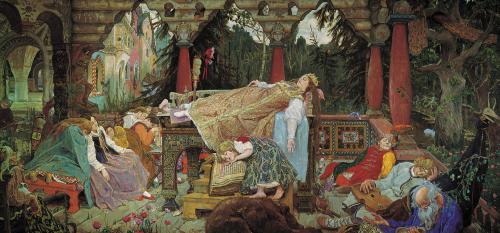
The Sleeping Princess
The ringing bells and the booming cannon
Proclaimed on a summer morn
That in the good king’s royal palace
A Princess had been born.
The towers flung out their brightest banners,
The ships their streamers gay,
And every one, from lord to peasant,
Made joyful holiday.
Great plans for feasting and merry-making
Were made by the happy king;
And, to bring good fortune, seven fairies
Were bid to the christening.
And for them the king had seven dishes
Made out of the best red gold,
Set thickly round on the sides and covers
With jewels of price untold.
When the day of the christening came, the bugles
Blew forth their shrillest notes;
Drums throbbed, and endless lines of soldiers
Filed past in scarlet coats.
And the fairies were there the king had bidden,
Bearing their gifts of good–
But right in the midst a strange old woman
Surly and scowling stood.
They knew her to be the old, old fairy,
All nose and eyes and ears,
Who had not peeped, till now, from her dungeon
For more than fifty years.
Angry she was to have been forgotten
Where others were guests, and to find
That neither a seat nor a dish at the banquet
To her had been assigned.
Now came the hour for the gift-bestowing;
And the fairy first in place
Touched with her wand the child and gave her
“Beauty of form and face!”
Fairy the second bade, “Be witty!”
The third said, “Never fail!”
The fourth, “Dance well!” and the fifth, “O Princess,
Sing like the nightingale!”
The sixth gave, “Joy in the heart forever!”
But before the seventh could speak,
The crooked, black old Dame came forward,
And, tapping the baby’s cheek,
“You shall prick your finger upon a spindle,
And die of it!” she cried.
All trembling were the lords and ladies,
And the king and queen beside.
But the seventh fairy interrupted,
“Do not tremble nor weep!
That cruel curse I can change and soften,
And instead of death give sleep!
“But the sleep, though I do my best and kindest,
Must last for an hundred years!”
On the king’s stern face was a dreadful pallor,
In the eyes of the queen were tears.
“Yet after the hundred years are vanished,”–
The fairy added beside,–
“A Prince of a noble line shall find her,
And take her for his bride.”
But the king, with a hope to change the future,
Proclaimed this law to be:
That, if in all the land there was kept one spindle,
Sure death was the penalty.
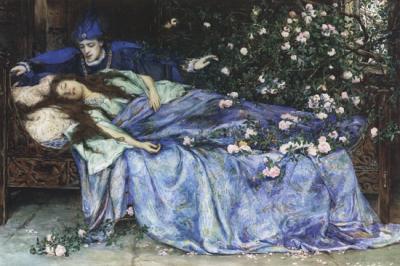
The Princess grew, from her very cradle
Lovely and witty and good;
And at last, in the course of years, had blossomed
Into full sweet maidenhood.
And one day, in her father’s summer palace,
As blithe as the very air,
She climbed to the top of the highest turret,
Over an old worn stair
And there in the dusky cobwebbed garret,
Where dimly the daylight shone,
A little, doleful, hunch-backed woman
Sat spinning all alone.
“O Goody,” she cried, “what are you doing?”
“Why, spinning, you little dunce!”
The Princess laughed: “‘Tis so very funny,
Pray let me try it once!”
With a careless touch, from the hand of Goody
She caught the half-spun thread,
And the fatal spindle pricked her finger!
Down fell she as if dead!
And Goody shrieking, the frightened courtiers
Climbed up the old worn stair
Only to find, in heavy slumber,
The Princess lying there.
They bore her down to a lofty chamber,
They robed her in her best,
And on a couch of gold and purple
They laid her for her rest,
The roses upon her cheek still blooming,
And the red still on her lips,
While the lids of her eyes, like night-shut lilies,
Were closed in white eclipse.
Then the fairy who strove her fate to alter
From the dismal doom of death,
Now that the vital hour impended,
Came hurrying in a breath.
And then about the slumbering palace
The fairy made up-spring
A wood so heavy and dense that never
Could enter a living thing.
And there for a century the Princess
Lay in a trance so deep
That neither the roar of winds nor thunder
Could rouse her from her sleep.

Then at last one day, past the long-enchanted
Old wood, rode a new king’s son,
Who, catching a glimpse of a royal turret
Above the forest dun
Felt in his heart a strange wish for exploring
The thorny and briery place,
And, lo, a path through the deepest thicket
Opened before his face!
On, on he went, till he spied a terrace,
And further a sleeping guard,
And rows of soldiers upon their carbines
Leaning, and snoring hard.
Up the broad steps! The doors swung backward!
The wide halls heard no tread!
But a lofty chamber, opening, showed him
A gold and purple bed.
And there in her beauty, warm and glowing,
The enchanted Princess lay!
While only a word from his lips was needed
To drive her sleep away.
He spoke the word, and the spell was scattered,
The enchantment broken through!
The lady woke. “Dear Prince,” she murmured,
“How long I have waited for you!”
Then at once the whole great slumbering palace
Was wakened and all astir;
Yet the Prince, in joy at the Sleeping Beauty,
Could only look at her.
She was the bride who for years an hundred
Had waited for him to come,
And now that the hour was here to claim her,
Should eyes or tongue be dumb?
The Princess blushed at his royal wooing,
Bowed “yes” with her lovely head,
And the chaplain, yawning, but very lively,
Came in and they were wed!
But about the dress of the happy Princess,
I have my woman’s fears–
It must have grown somewhat old-fashioned
In the course of so many years!
Clara Doty Bates
(1838 – 1895)
The Sleeping Princess
Versified by Mrs. Clara Doty Bates
fleursdumal.nl magazine
More in: Archive A-B, Archive A-B, Bates, Clara Doty, Children's Poetry, Grimm, Andersen e.o.: Fables, Fairy Tales & Stories, Tales of Mystery & Imagination
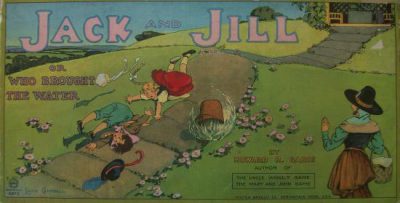
Jack And Jill
Little boys, sit still–
Girls, too, if you will–
And let me tell you of Jack and Jill;
For I think another
Such sister and brother
Were never the children of one mother!
For an idle lad,
As he was, Jack had
No traits, after all, that were very bad.
He, was simply Jack,
With the coat on his back
Patched up in all colors from gray to black.

Both feet were bare;
And I do declare
That he never washed his face; and his hair
Was the color of straw–
You never saw
Such a crop–as long as the moral law!
When he went to school,
It was the rule
(Though ’twas hard to say he was really a fool)
To send him at once,
So thick was his sconce,
To the block that was kept for the greatest dunce.
And Jill! no lass
Scarce ever has
Made bigger tracks on the country grass;
For her only fun
Was to romp and run,
Bare-headed, bare-footed, in wind and sun.
Wherever went Jack,
Close on his track,
With hair unbraided and down her back,
Loud-voiced and shrill,
She followed, until
No one said “Jack” without saying “Jill.”
But to succeed
In teaching to read
Such a harum-scarum, was work indeed!
And I’m forced to tell
That her way to spell
Her name was with only a single ‘l.’
Yet they were content.
One day they were sent
To the hill for water, and they went.
They did not drown,
But Jack fell down,
With a pail in his hand, and broke his crown!
And Jill, who must go
And always do
Exactly as Jack did, tumbled too!
Just think, if you will,
How they rolled down hill–
Straw-headed Jack and bare-footed Jill!
But up Jack got,
And home did trot,
Nor cared whether Jill was hurt or not;
While his poor bruised knob
Did burn and throb,
Tear falling on tear, sob following sob!
He could run the faster,
So a paper plaster
Had bound up the sight of his disaster
Before Jill came;
And the thoughtful dame,
For a break in her head, had fixed the same.
But Jill came in,
With a saucy grin
At seeing the plight poor Jack was in;
And when she saw
That bundle of straw
(His hair) bound up with a cloth, and his jaw
Tied up in white,
The comical sight
Made her clap her hands and laugh outright!
The dame, perplexed
And dreadfully vexed,
Got a stick and said, “I’ll whip her next!”
How many blows fell
I will not tell,
But she did it in earnest, she did it well,
Till the naughty back
Was blue and black,
And Jill needed a plaster as much as Jack!
The next time, though,
Jack has to go
To the hill for water, I almost know
That bothering Jill
Will go up the hill,
And if he falls again, why, of course she will!
Clara Doty Bates
(1838 – 1895)
Jack And Jill
Versified by Mrs. Clara Doty Bates
fleursdumal.nl magazine
More in: Archive A-B, Archive A-B, Bates, Clara Doty, Children's Poetry, Grimm, Andersen e.o.: Fables, Fairy Tales & Stories, Tales of Mystery & Imagination
Thank you for reading Fleurs du Mal - magazine for art & literature